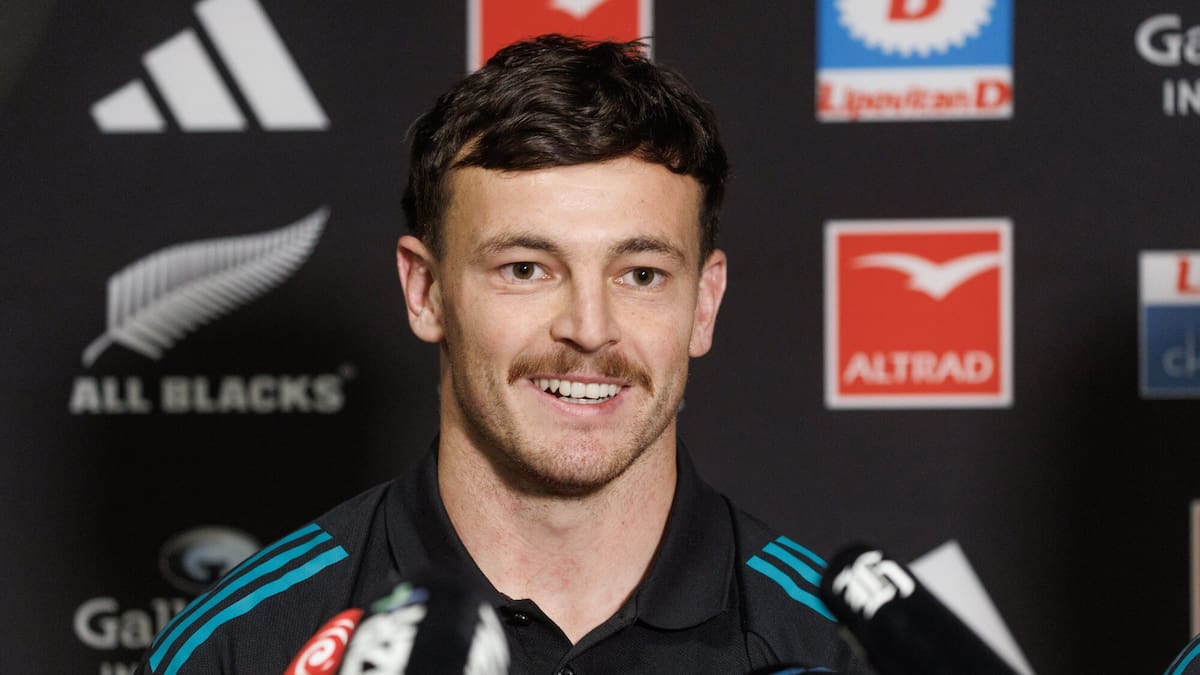Carter has endured and shown that, for all the well-founded fears about the lack of natural adversity most modern teenagers confront on their way to adulthood, there are some plucky battlers out there prepared to metaphorically roll up their sleeves and scrap for what they want but don’t appear destined to get.
All Blacks debutant wing Leroy Carter meets the media after the team announcement in Wellington. Photo / Mark Mitchell
After leaving Tauranga Boys’ College, Carter split his time between playing for the Steamers and learning to be an electrician.
While his elite peers were living in their cosseted high-performance worlds and buoyed by knowing that, on statistical probabilities, they were destined to make the big time, Carter was clocking in for a hard day’s grind. He was fitting in training around his work, while carrying the mental burden of knowing that he was statistically unlikely to make the big time.
He balanced real life with rugby life until he went full-time with the New Zealand Sevens team in 2022, and then used that to win a contract with the Chiefs this year.
What makes his story yet more remarkable and defiant of the odds is that he’s going to slip just 86kg of flesh and bone into an All Blacks No 11 jersey that has in the past been filled by behemoths such as Jonah Lomu (120kg) and Julian Savea (108kg). Even the most recent occupant, Rieko Ioane, was putting almost 25% more human into the shirt than Carter will.
But Carter’s relative lack of size is all part of who he is: a tough, resilient young man who has fought relentlessly to fulfil his dream.
He may be relatively small by modern wing standards, but he showed throughout Super Rugby that he’s big enough and brave enough to get over tackled players, drop his head and win turnovers.
All Blacks coach Scott Robertson has said that Carter is the quickest player in the country, and, while he hasn’t provided the evidence to confirm this, no one disputes it.
Carter showed in Super Rugby that he was quick enough to get on the outside of defenders. That matters more than any data from a GPS tracker.
It’s a tough ask to debut against the Boks, but the coaching group obviously have confidence that the circuitous route Carter has taken to this point has equipped him with a sense of perspective and breadth of experience not to be overawed by the occasion.
And while it’s true that the nation wishes every new All Black the best of luck on debut, it’s maybe the case that everyone is really rooting for an underdog; someone who will reignite a nostalgic possibility that, in time, we will see more characters like Carter make it to the All Blacks from real-world pathways.
Rugby increasingly seems a game in thrall to its sponsors, and driven by ever greater commercial enterprises, and so to see a bloke who did the wiring on Nana’s kitchen play for the All Blacks this Saturday is quite the romantic throwback to a forgotten age of All Blacks being among us in the community.
That feels quintessentially New Zealand – more on-brand with the traditional values of the All Blacks. Carter and Preston have shown that, no matter what lies ahead for them, the All Blacks remain accessible to those who miss the high-performance boat in their late teens.
Gregor Paul is one of New Zealand’s most respected rugby writers and columnists. He has won multiple awards for journalism and written several books about sport.

